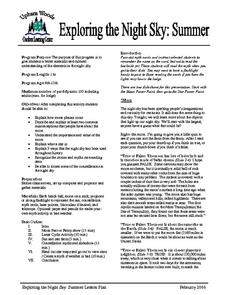Curated OER
Exploring Stars
Students discuss the life of a star and the different types of stars after watching the Discovery video "Exploring Stars". They create a flipbook that demonstrates the life of a star after collecting information on the life cycles of...
University of Texas
Lives of Stars
Stars exist from a few million years to over 10 billion years, depending on their mass. Scholars perform a play acting as stars to learn about their different life cycles. They develop an understanding of many of the fundamental concepts...
Curated OER
Stars and Slopes
More of a math lesson than physics or space science, high schoolers take a set of data and plot it on a log-log coordinate system. The write-up for day two was never completed, but day one, "Stars and Slopes," is complex and cohesive....
Space Awareness
Make a Star Lantern
Go star-gazing with young learners! They study the history, origins, and patterns of constellations in an activity that explores the starry night sky.
Curated OER
Types Of Nebulae
Eighth graders explore the different types of nebulae that can be found in the solar system. They view a PowerPoint presentation about the material and identify each nebulae as it is presented. Students also discuss the life cycle of a...
Curated OER
Evolution of Stars
In this stars worksheet, students review the different types of stars by filling in the blank of 14 statements. Students then find those terms in a word search.
American Museum of Natural History
The Milky Way Galaxy
Just how big is the galaxy? Learners read information about the size of the Milky Way galaxy to better comprehend its size. Pupils develop an understanding of the number of stars in the galaxy by finding just how big a billion is and...
Curated OER
Spectral Classification of Stars
In this spectral composition of stars worksheet, students use data collected by a spectroscope to compare the stellar spectra to a standard for 5 stars. Students compare the spectral lines to the temperatures of the stars.
Curated OER
Star Light, Star Bright: Exploring How Stars are Classified
In this star classification activity, middle schoolers are given laminated star charts to make observations about stars. They work in groups to classify groups of stars based on different characteristics. For each group of stars they...
Physics Classroom
Using Graphs
Many university professors complain incoming scholars struggle with interpreting graphs. A skill builder offers three different types of exercises including calculating slope, interpreting graphs, and extrapolating outside the plotted...
Curated OER
Exploring Stars
Fifth graders explore the life cycle of stars. They analyze small, medium, and large stars and view a video that compares the life cycles of the various sized stars. They create a flipbook movie detailing the life cycles of a star and...
Curated OER
The Lives of Stars
In this stars worksheet, learners review what makes up a star, how astronomers learn about stars, and the different types of stars including low mass and high mass stars. This worksheet has 62 fill in the blank statements.
Curated OER
Star Cluster Math
In this star cluster math worksheet, students use four different patterns to solve five problems about the fraction of stars classified by their temperature.
Curated OER
The Spectrum of a Star
Tenth graders identify stars based on their line spectra. In this astronomy lesson, 10th graders analyze spectrograph and determine the elements present in the star. They explain the relationship between temperature and star classes.
Curated OER
Unit 2 Sun & Stars
Young scholars describe stellar objects using terms such as stars, planets, satellites, orbits and light. For this sun and stars unit, students research stellar objects through seven individual lessons discovering star characteristics,...
Curated OER
Star Light, Star Bright : Exploring How Stars Are Classified
Young scholars work in small groups to organize stars into different categories. They consider size, luminosity, color and temperature, organize the groups and ten report their categories to the class.
Curated OER
Selling the Stars
Students create a travel brochure, poster, and presentation to encourage others to visit a star. For this stellar characteristics lesson, students research a star type based on its life-cycle. They create a travel campaign to convince...
Glynn County School System
Other Galaxies
The Milky Way belongs to a cluster of galaxies called the local group and it could be considered our neighborhood! Use the PowerPoint to present information on the different galaxy types, both local and farther away. Scholars learn how...
Curated OER
Spectral Lines
Slides and slides of emission spectra bring this topic to light for your physics class! Exited electrons returning to lower energy levels is offered as the cause of emission spectra. In summary, viewers learn that we can determine the...
Teach Engineering
Antimatter Matters
Use science fiction movies to teach pupils about antimatter and alternate universes. Individuals learn about the portrayal of antimatter and alternate universes in movies such as Star Trek and Angels & Demons. They consider three...
Curated OER
How Hot and How Big?
Students explore star color and size. In this space science activity, students conduct various inquiry activities to explore how the color of a star affects the amount of heat produced. They also investigate how the color of stars...
Curated OER
My Life as a Star!
Learners research the life cycle of a star and present their finding to the class.
Curated OER
Exploring the Night Sky: Summer
Learners explain how moon phases occur. They describe and explain at least two common misconceptions that people have about the moon. Students explain what a star is. They explain 3 ways that the night sky has been used throughout history.
NASA
Discovering Some of Your “Yardsticks” Are Actually “Meter-sticks”
The Milky Way gets great reviews on Trip Advisor — 100 million stars. The activity allows scholars to rethink their assumptions and prior knowledge. Pupils observe a set of two lights at equal distance and brightness, but they believe...























